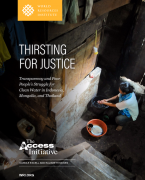Thirsting for justice: transparency and poor people’s struggle for clean water in Indonesia, Mongolia, and Thailand
 Industrial facilities release upwards of 400 million tons of toxic pollutants into the world’s waters each year. Yet secrecy around the amount and type of chemicals that companies discharge is still the norm, especially in Asia. Contaminated water threatens the region’s poorest communities—those who still depend on local water sources for their lives and livelihoods. Without access to water pollution information, they can’t determine whether their water is safe to drink, fish or give to their animals. They can’t participate in decision-making, hold law-breaking polluters to account or lead local cleanup efforts. Thirsting for Justice: Transparency and Poor People’s Struggle for Clean Water in Indonesia, Mongolia, and Thailand reveals that, like many Asian countries, the governments of Indonesia, Mongolia and Thailand are not effectively telling the public if the water they rely on for drinking, bathing, farming and fishing is polluted or dangerously toxic. The Access Initiative (TAI) report finds that, despite passing strong “right to know” laws, these governments are putting their poorest communities at risk by not providing the water pollution information that people need.
Industrial facilities release upwards of 400 million tons of toxic pollutants into the world’s waters each year. Yet secrecy around the amount and type of chemicals that companies discharge is still the norm, especially in Asia. Contaminated water threatens the region’s poorest communities—those who still depend on local water sources for their lives and livelihoods. Without access to water pollution information, they can’t determine whether their water is safe to drink, fish or give to their animals. They can’t participate in decision-making, hold law-breaking polluters to account or lead local cleanup efforts. Thirsting for Justice: Transparency and Poor People’s Struggle for Clean Water in Indonesia, Mongolia, and Thailand reveals that, like many Asian countries, the governments of Indonesia, Mongolia and Thailand are not effectively telling the public if the water they rely on for drinking, bathing, farming and fishing is polluted or dangerously toxic. The Access Initiative (TAI) report finds that, despite passing strong “right to know” laws, these governments are putting their poorest communities at risk by not providing the water pollution information that people need.
